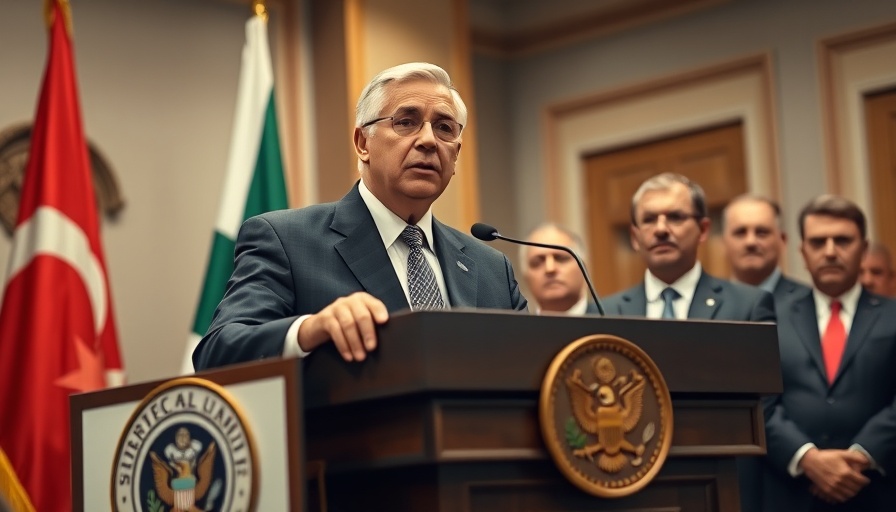
Fact-Checking President Trump's Speech to Congress: What You Need to Know
The recent address by President Donald Trump to Congress was not only a showcase for his political agenda but also served as a crucial opportunity for fact-checkers to assess his statements. Lasting nearly two hours, Trump's speech featured a number of claims that provoked significant scrutiny. Here, we dissect some of his assertions, highlighting context and factual accuracy.
A Closer Look at Trump's Claims on Economic Policy
One of Trump's prominent statements claimed, "Joe Biden especially let the price of eggs get out of control—and we are working hard to get it back down." This assertion lacks comprehensive context. While it is true that egg prices rose under Biden's tenure, their significant hike can be attributed mainly to external factors like the bird flu outbreak, which wiped out millions of poultry, causing a market shift. Prices surged as high as $4.95, emphasizing that the issue isn't limited to Biden's policies alone.
The Controversy Over Election Mandates
Trump asserted he won a strong mandate during the election cycle, yet this claim is contentious. While he indeed secured the Electoral College and popular vote, historical comparisons show that his margins of victory were modest. Many counties traditionally favoring Republican candidates shifted towards him, but this was not synonymous with a sweeping victory. Such nuances remind voters of the complexities of electoral success in contemporary politics.
Context Matters: The Electric Vehicle Mandate Revisited
During his address, Trump stated, “We ended the last administration's insane electric vehicle mandate.” However, this assertion needs clarity. The Biden administration did not impose an electric vehicle mandate per se; instead, they established emissions standards impacting future model years. Trump's revocation of these standards might resonate with some voters, yet it oversimplifies an intricate regulatory landscape that affects manufacturers broadly. This leads to crucial discussions about environmental policies that influence economic outcomes.
Assessing the Paris Climate Accord Claims
One of Trump's more audacious claims involved the costs of the Paris Climate Accord, which he alleged was costing the U.S. "trillions." Fact-checkers quickly dismissed this, stating that the projections presented do not reflect immediate financial commitments but rather hypothetical long-term outcomes based on economic modeling. This distinction is vital for understanding the impact of climate agreements versus actual fiscal spending.
The Unverified Numbers: Social Security and Age
Trump made headlines when he referenced that Elon Musk found individuals as old as 369 in the Social Security database. This remark is misleading, as officials clarified that age-related discrepancies can arise from system complexities, not fraudulent activity. Such statements can foster public misunderstanding regarding government databases, reflecting the need for clear communication about federal systems.
Looming Economic Impacts of Tariffs
In discussing tariffs, Trump claimed, "There will be a little disturbance for Americans because of tariffs." Fact-checking reports from economic analysts predict that tariffs could add approximately $2,000 to annual household expenses. For instance, tariffs on cars could significantly inflate vehicle prices by thousands of dollars. This intensely shows how policy decisions can trickle down to affect everyday Americans.
Social Impact and Misconceptions about Autism
Trump stated, "Not long ago... 1 in 10,000 children had autism. Now it's 1 in 36. There’s something wrong." While he was partially correct about the rise in autism diagnoses, mentioning the previous statistic lacks sourcing and context. Experts attribute the increase in part to heightened awareness and improved diagnostic criteria. This highlights the importance of basing health-related conversations on robust data rather than anecdotal claims.
The Role of Fact-Checking in Political Discourse
This presidential address underscores a growing necessity for diligent fact-checking in political rhetoric. An informed citizenry relies on accurate data to navigate complex national narratives. With political figures expounding various claims during high-stakes addresses, understanding these facts can help citizens engage in meaningful discussions about policy and governance.
Calls for accountability through rigorous fact-checking are crucial, as evidenced by the mixed reception of Trump's claims. Regularly consuming vetted information empowers citizens, allowing them to discern credible narratives amidst political volatility.
As you engage in political discussions, prioritize seeking out verified information to foster a more informed society. Your active participation is essential in shaping the narrative.
 Add Element
Add Element  Add Row
Add Row 



Write A Comment